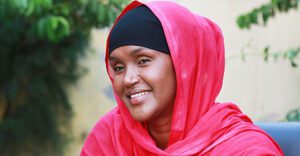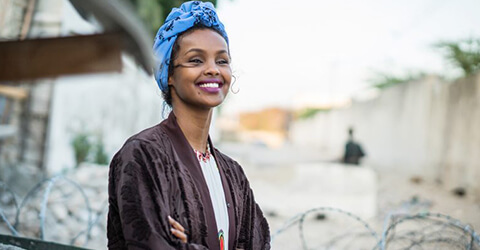Ilwad Elman is the Program Director at Elman Peace and Human Rights Centre, where she oversees the organization’s human rights, gender justice, countering violent extremism, and peacebuilding efforts. She is the youngest advisor to the United Nations’ Secretary General Antonio Guterres’ Peacebuilding Fund, an advocate for the Kofi Annan Foundation and former mentee of the late Kofi Annan, and expert advisor to the UN Youth, Peace and Security agenda and a global board member for UNICEF on the Generation Unlimited initiative. Ilwad received the Gleitsman International Activist Award from Harvard in 2015, 2016 Right the Wrongs Award from Oxfam America, and the 2017 BET Global Good Star Award, among other notable awards and recognitions.

Ilwad was born in Mogadishu, Somalia and is one of four daughters. She is the child of the late Peace Activist and Entrepreneur Elman Ali Ahmed and Social Activist, Fartuun Adan. Her father was an ardent Peace Activist in Somalia in the 1990s, who coined the famous mantra, ‘Drop the Gun, Pick up the Pen.’
While she was just a child, Ilwad was forced to flee Somalia and shift to Canada with her mother and sisters due to the civil war that broke out during that time. Elman Ali Ahmed, her father, decided to stay behind in Somalia to continue his efforts to help former child soldiers. Unfortunately, he was tragically murdered in 1996.
However, her mother soon moved back to Mogadishu. Fartuun, Ilwad’s mother, explained, “My husband lost his life because of his aversion to violence. So, I knew I had to spend mine protecting those who were most vulnerable to it.”
When she returned to Somalia, she founded The Elman Peace and Human Rights Centre, which looks at the underlying causes that pull people – especially young boys – into armed conflicts and helps build peace through training and education. After more than two decades of war, a generation of Somali children have lost out on receiving a formal education. There are few public schools in the area, and extreme poverty makes it nearly impossible for parents to afford school fees.
However, Ilwad failed to understand what drew her mother back to Somalia, a place that had already caused her family so much despair and suffering. But that changed during a short visit to Mogadishu; she witnessed the impact her mother’s work had on the people. That month-long trip convinced Ilwad to stay back and continue her parent’s mission.
“That’s when I realized,” recalled Ilwad, “that in the same way my sisters and I needed her, hundreds of other people needed her as well. We needed her to be our mother in Canada, but hundreds of people were calling her ‘mom’ in Somalia. That’s what really put everything into perspective. When I visited, I was scared, I had so many preconceptions and I just wanted to run away and feel safe again. But the people my mother was helping didn’t have that option. This was just their life. And I knew I had to let her support them, and that I had to support her.”
She joined her mother in Mogadishu in 2010 – at significant personal risk – to assist her mission and help with the development of their country, which has been embroiled in a complex civil war.
Through the work with child soldiers, Fartuun and Ilwad were also confronted by the scale of sexual violence and rape. “It was happening everywhere, but everyone was denying it. They weren’t talking about it,” Fartuun said. “We had to do something to help these women. We had to do something to give them a voice.”
In response, they founded the Sister Somalia Initiative, the first-ever rape crisis centre in Mogadishu. The initiative supports Somali sexual violence survivors and those who have escaped forced marriages by providing counselling, medical services, relocation, education and business starter kits. They educate young girls to know their rights and have supported the rehabilitation of more than 8,000 women subjected to sexual exploitation to date.
According to Ilwad, rape isn’t happening in just camps for those forced from their homes by war but in the broader community, “which is also affected by rampant abuse of sexual and gender-based violence,” she added. Ilwad noted that multiple factors are to blame, but the main one is conflict, which has affected every Somali during more than two decades of war.
“Rape is a well-known weapon of war, so that is one thing that is undeniable. To add to that, there’s also harmful traditional practices, destroyed social protection structures that were in place before the war,” she said. Put all these factors together, and that is why rape is so rampant in Somalia. Rape in Somalia carries a tremendous social stigma attached to the victim; after the long years of conflict and despair in the region, there is no way of knowing the exact number of women who were raped or are currently suffering in silence.
Ilwad recalled an incident with a rape victim their organization helped. “There was one woman, Nadifa, who had been out trying to secure food for her family at a neighboring [refugee] camp. After hours in line she returned home with nothing, walking in to find a man raping her 11-year-old daughter in front of her younger children. She tried to protect them, but was dragged outside of the camp by soldiers who bound her arms and feet and covered her head with a sack, beating her until she was unconscious. They tortured her, burning plastic deep into her skin over every part of her body. Several weeks later she came to the Centre seeking help. Today she is a business owner and still returns to the Centre almost daily, bringing more women and girls to the program.”
She continued, “We are starting to see a cultural shift. The tolerance of the heinous violence against women and girls is diminishing, but slowly. It is amazing seeing people who had lost hope become empowered. It’s really beautiful and inspires us to continue.”
The mother-daughter duo wishes to construct a purpose-driven facility where victims and survivors can come together, so they can create a community that helps with education and rehabilitation.
“Seeing people leave the Centre with their heads held high, ready and determined to build their own life is what keeps us going,” said Fartuun. “With our help they are now able to help others, which is what we need in order to rebuild this society. By doing this, we can all have an impact on the future of Somalia.”







